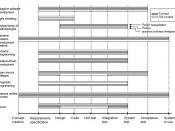Executive Summary:Wipro Technologies, India's largest IT services company and one of the world's leading innovation companies, in conjunction with the Harvard Business School, has been experimenting with a new software service delivery model that draws on the principles of the Toyota production system and "lean" manufacturing. Wipro is experimenting with a new software service delivery model that draws on the principles of the Toyota production system and "lean" manufacturing. The case study addresses the advantages and disadvantages of software outsourcing and how to mitigate the effects of, for example, lock-in and hijacking. The case study also explores how Wipro has used the Factory Model to help its client companies deal with these issues and looks at the changing competitive role of Indian outsourcers (from low-cost, to high-quality/rapid turnaround). Specifically, it explores Wipro's experimental use of lean principles as a source of new competitive advantage in software services. Additionally, the case study addresses the issue of standardization in information technology, examining why companies progressively develop so many standards and how companies like Wipro can help them standardize, thus limiting one of the primary drivers of companies' IT costs.
Wipro's "Promise Statement" which laid more emphasis on the "customer", defined a "customer" of Wipro and conveyed Customer, Integrity, Human Values, Innovation and Value for Money as Wipro values.
The dilemma NS Bala is facing is as to how Wipro should organize itself for this new Factory Model. He also wonders if principles of lean manufacturing really work in software development. He wondered as to how far the analogy of a factory - and the principles of the Toyota Production System - could be applied.
Benefits from the "Factory Model":Reusability: The migration capability teams - experts and project teams - will continuously identify opportunities to develop best practices for delivering migration...


